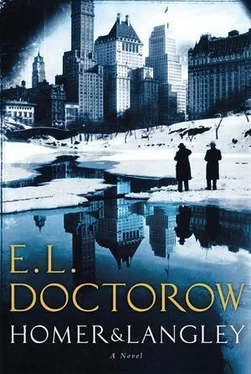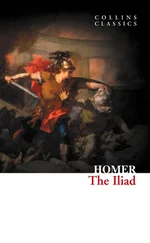E. Doctorow - Homer & Langley
Здесь есть возможность читать онлайн «E. Doctorow - Homer & Langley» весь текст электронной книги совершенно бесплатно (целиком полную версию без сокращений). В некоторых случаях можно слушать аудио, скачать через торрент в формате fb2 и присутствует краткое содержание. Год выпуска: 2009, Издательство: Random House, Жанр: Современная проза, на английском языке. Описание произведения, (предисловие) а так же отзывы посетителей доступны на портале библиотеки ЛибКат.
- Название:Homer & Langley
- Автор:
- Издательство:Random House
- Жанр:
- Год:2009
- ISBN:нет данных
- Рейтинг книги:5 / 5. Голосов: 1
-
Избранное:Добавить в избранное
- Отзывы:
-
Ваша оценка:
- 100
- 1
- 2
- 3
- 4
- 5
Homer & Langley: краткое содержание, описание и аннотация
Предлагаем к чтению аннотацию, описание, краткое содержание или предисловие (зависит от того, что написал сам автор книги «Homer & Langley»). Если вы не нашли необходимую информацию о книге — напишите в комментариях, мы постараемся отыскать её.
Brilliantly conceived, gorgeously written, this mesmerizing narrative, a free imaginative rendering of the lives of New York’s fabled Collyer brothers, is a family story with the resonance of myth, an astonishing masterwork unlike any that have come before from this great writer.
Homer & Langley — читать онлайн бесплатно полную книгу (весь текст) целиком
Ниже представлен текст книги, разбитый по страницам. Система сохранения места последней прочитанной страницы, позволяет с удобством читать онлайн бесплатно книгу «Homer & Langley», без необходимости каждый раз заново искать на чём Вы остановились. Поставьте закладку, и сможете в любой момент перейти на страницу, на которой закончили чтение.
Интервал:
Закладка:
THE HEAVY HOUSEWORK that went along with our enterprise was indeed too much for poor Siobhan. When she didn’t come down from her room one morning Mrs. Robileaux went up to see what was the matter and found the poor woman dead in her bed, a rosary wound around her fingers.Siobhan had no relatives that we knew of, and there were no letters in her bureau drawer, nothing to indicate she’d had a life outside our house. But we did find her savings bankbook. Three hundred and fifty dollars, a tidy sum in those days unless you understood these were her life savings after more than thirty years’ employment with our family. She did have her church, of course, St. Agnes on the West Side in the Fifties, and they took care of the obsequies for us. The priest there accepted Siobhan’s bankbook, whose sums, he said, could be designated for the church’s expenses after the State had gone through its usual rigmarole.By way of atonement Langley placed paid obituaries in every single paper in the city, not only the majors like the Telegram and the Sun and the Evening Post and the Tribune , the Herald , the World , the Journal , the Times , the American , the News , and the Mirror , but in the Irish Echo and the outlying papers, like the Brooklyn Eagle and the Bronx Home News and even the Amsterdam News , for colored folks. To the effect that this good and pious woman had devoted her life to the service of others, and with her simple heart and passion for cleanliness she had enriched the lives of two generations of a grateful family.But wait — I may be mistaken about the number of newspapers that ran Siobhan’s obituary, for by this time the World had merged with the Telegram , and the Journal had combined with the American and the Herald with the Tribune —mergers I remember Langley reporting to me with some satisfaction as early signs of the inevitable contraction of all newspapers to one ultimate edition for all time of one newspaper, namely his.Ours was the only car behind the hearse in the ride to Queens. We were to bury Siobhan in a vast hill-crawling necropolis of white marble crosses and winged angels cast in cement. Mrs. Robileaux, whom we had taken to calling Grandmamma in the manner of her grandson, Harold, sat in state next to me. For the occasion she wore a mothball-smelling stiff dress that crinkled as she moved and a hat whose broad brim kept slicing into the side of my head. She spoke of her fears for Harold, who was at this time back in New Orleans. He claimed in his letters that he was getting steady work playing the clubs, but she worried that he was making things out better than they really were so that she wouldn’t worry.We were all in a somber mood. With the image of poor Siobhan in my mind, and remembering my trips to the Woodlawn Cemetery to bury my parents, I could only think of how easily people die. And then there was that feeling one gets in a ride to a cemetery trailing a body in a coffin — an impatience with the dead, a longing to be back home where one could get on with the illusion that not death but daily life is the permanent condition.
THE ITEM ABOUT US in the “what to do, where to go” section of one of the evening papers was the first sign of trouble: something to the effect of a high-class taxi dance on Fifth Avenue where you could rub shoulders with the upper crust. We didn’t know how the item got there. Langley said, These newspaper people are illiterate — how can one rub shoulders with an upper crust?At the very next dance we had to close the doors with people still clamoring to get in. Those we had to turn away sat down on the stoop and milled about on the sidewalk. They were noisy. Naturally there followed complaints from the residences south of us: a letter of articulate disapproval, hand-delivered by someone’s butler, and an angry phone call from someone who would not give her name, although there may have been more than one phone call from more than one person. Indignation. Umbrage. The neighborhood going to seed. And of course there was the visitation one day of a policeman, though he seemed not to be acting on the complaints of our neighbors. He had his own amiable view of the problem.Standing at the open door he brought a cold breeze in with him. He announced in rather formal tones that it was against the law to operate a commercial enterprise out of a residence on Fifth Avenue. Then his whiskeyed voice softened: But seeing as you are respectable folks, he said, I am inclined to overlook the matter for a kindly donation of, say, fifteen percent of the weekly monies to the Police Beneficiaries League.Langley said he had never heard of the Police Beneficiaries League and asked what its work was.The cop didn’t seem to hear. I leave the accounting to you in good faith, Mr. Coller, and I will come by of a Wednesday morning for the remittance and no questions asked, but with a floor of ten dollars.Langley said: What do you mean “a floor”?The cop: Well, sir, it would not be worth my time for anything less.Langley: I understand that criminal matters in this city do press upon your time, Officer. But you see we don’t charge much for our tea dances, they are offered more in the nature of a public service. If we have forty couples of an afternoon it’s a lot. Add to that our overhead — refreshments, labor costs — and well, we might think about supporting your Police Beneficiaries League with a bribe or, as you call it, a floor of maybe five dollars a week. And for that we would of course expect you to stand out front every Tuesday and touch your cap.Well now, Mr. Coller, if it was up to me, I would say to you “done and done.” But I have my overhead as well.And that is …?My sergeant over to the precinct.Ah yes, Langley said to me, now we’re getting to it.My brother’s voice had become raspier. I knew he was toying with the fellow. I thought I would like to take him aside and review the matter, but he was well on his way. Did you really think, he said to the officer, did you really think that the Collyers would give in to a police department shakedown? In my book that’s called extortion. So if anyone is breaking the law around here it is you.The cop tried to interrupt.You’ve come to the wrong door, Officer, Langley said. You’re a thief, plain and simple, you and your sergeant together. I can respect true bold criminality but not the sly sniveling corruption of your sort. You’re a disgrace to the uniform. I would report you to your superiors if they weren’t of the same miserable beggarly caste. Now you will get off our property, sir — out, out!The cop said, You have a sharp tongue, Mr. Coller. But if that’s your pleasure I’ll be seeing you.As the cop turned and went down the steps Langley shouted something I will not repeat here and slammed the door.Langley’s exertions had brought on one of his coughing spells. It was difficult to listen to, his wheezing, basso, lung-riddled cough. I went to the kitchen and brought him a glass of water.When he had calmed down I said to him, That oration was pretty good, Langley. Had a kind of music to it.I alleged he was a disgrace to his uniform. That was wrong. The uniform is a disgrace.The cop said he’d be seeing us. I wonder what that meant.Who cares? Cops are crooks with badges. When they’re not taking payoffs, they’re beating people up. When they get bored they shoot someone. This is your country, Homer. And for its greater glory I have had my lungs seared.
FOR A WEEK OR TWO, that seemed to be the end of it. Then during one of our dances, there they were, as if that one cop had budded and rebudded until multiples of him were muscling through the rooms and ordering everyone to leave. People didn’t understand. In a moment we had a melee — scuffling, shouting, people tripping over one another. Everyone was trying to get out but the police in pushing them, shoving them were intent on creating havoc. The band I had put on the record player moments before kept playing as if in another dimension. How many police there were I don’t know. They were loud and bulked up the air. The front door was open and a chill wind blew in off the avenue. I didn’t know what to do. The shrieks I heard could have been merriment. With so many bodies in the room, I had the wild idea that the police in all their bulk were dancing with one another. But our poor tea dancers were being driven out the door like cattle. Grandmamma Robileaux had been standing near me with her salver of cookies. I heard a resounding gong, the sound made by a silver salver coming down on a skull. A male yowl and then a rain of cookies, like hail, splattering the floor. I was calm. It seemed to me of utmost importance to stop the music, I removed the record from the turntable and meant to slip it into its jacket when it was grabbed out of my hands and I heard it shatter on the floor. The Victrola was yanked away and heaved against the wall. Without knowing what I was doing — it was instinctive, an animal impulse, like the swat of a bear’s paw but something lazier, a sightless man’s distraction — I swung my fist through the air and hit something, a shoulder I think, and for my pains received a blow in the solar plexus that sent me to the floor gasping. I heard Langley shout, He’s blind, you idiot.And so ended the weekly tea dance at the Collyer brothers’.—WE WERE CHARGED with running a commercial enterprise in an area zoned only for residences, serving alcohol without a license, and resisting arrest. We notified the lawyers who were the executors of our parents’ estate. They would act promptly enough but not in time to save us from a night in the Tombs. Grandmamma Robileaux went downtown with us as well to spend the night in the women’s detention.I couldn’t sleep — not only because of all the noisy drunks and maniacs in the adjoining cells — I couldn’t get over the vindictiveness of the police who had raided the premises as if we were running a Prohibition-era speakeasy. I was outraged that I had been punched and didn’t know by whom. There was no way to avenge this. There was no appeal. There was nothing I could do about it except suffer my helplessness. I don’t know of a more desolate feeling than that. For the first time in my life I felt the incomplete man. I was in a state of shock.Langley was calm and reflective, as if it was the most natural thing in the world to be sitting in the Tombs at three in the morning. He said he’d saved a whole box of records from destruction. At that moment I couldn’t care less. You go along with the faculties you have almost as if you are normally equipped. And then something like this happens and you realize what a defective you are.Homer, Langley said, I have a question. Until we began playing records for the dancers, I never really paid much attention to popular songs. But they’re powerful little things. They stick in the mind. So what makes a song a song? If you put words to one of your études or preludes or any of those other pieces you like to play, it still wouldn’t be a song, would it? Homer, you listening?A song is usually a very simple tune, I said.Like a hymn?Yes.Like “God Bless America”?Like that, I said. It has to be simple so that anyone can sing it.So that’s why? Homer? So that’s why?Also it has a fixed rhythm that doesn’t change from beginning to end.You’re right! Langley said. I never realized that.Classical pieces have multiple rhythms.There is art to the lyrics too, Langley said. The lyrics are almost more interesting than the music. They boil down human emotions to their essence. And they touch on profound things.Like what?Well take that song where he says sometimes he’s happy sometimes he’s blue.“… my disposition depends on you.”Yes, well what if she’s saying the same thing at the same time?Who?The girl, I mean if her disposition depends on him at the same time his disposition depends on her? In that case one of two circumstances would prevail: either they would lock together in an unchanging state of sadness or happiness, in which case life would be unendurable — That’s not good. And what’s the other circumstance?The other circumstance is that if they began disynchronously, and each was dependent on the other’s disposition, there would be this constantly alternating mood current running between them, from misery to happiness and back again, so that they would each be driven mad by the emotional instability of the other.I see.On the other hand there’s that song about the man and his shadow?“ Me and My Shadow.”That’s the one. He’s walking down the avenue with no one to talk to but his shadow. So there’s the opposite problem. Can you imagine a universe like that, with only your own shadow to talk to? That is a song right out of German metaphysics.At that moment some drunk began to cry and moan. Then other voices began shouting and yelling at him to shut up. Then just as suddenly it was quiet.Langley, I said. Am I your shadow?In the darkness I listened. You’re my brother, he said.
Читать дальшеИнтервал:
Закладка:
Похожие книги на «Homer & Langley»
Представляем Вашему вниманию похожие книги на «Homer & Langley» списком для выбора. Мы отобрали схожую по названию и смыслу литературу в надежде предоставить читателям больше вариантов отыскать новые, интересные, ещё непрочитанные произведения.
Обсуждение, отзывы о книге «Homer & Langley» и просто собственные мнения читателей. Оставьте ваши комментарии, напишите, что Вы думаете о произведении, его смысле или главных героях. Укажите что конкретно понравилось, а что нет, и почему Вы так считаете.












